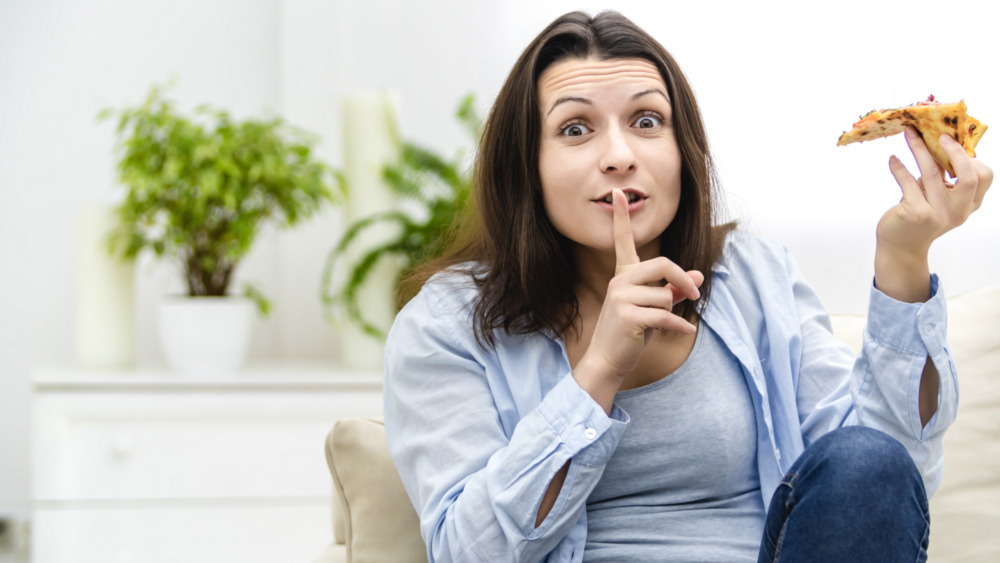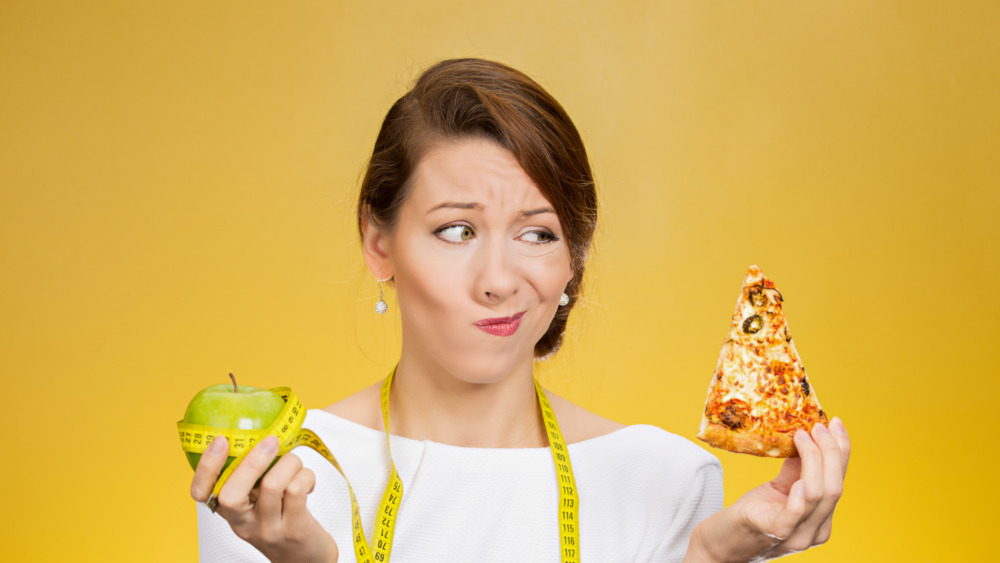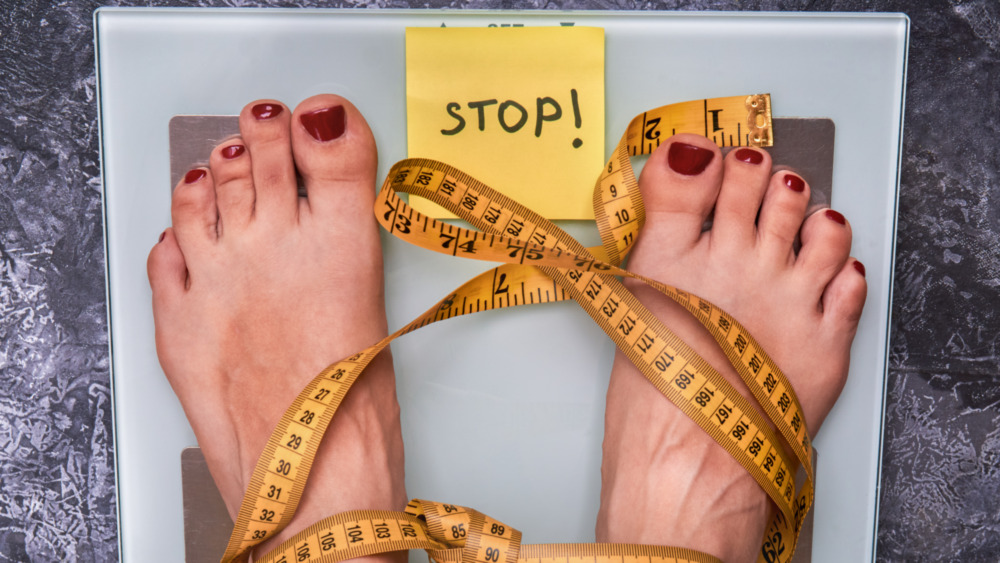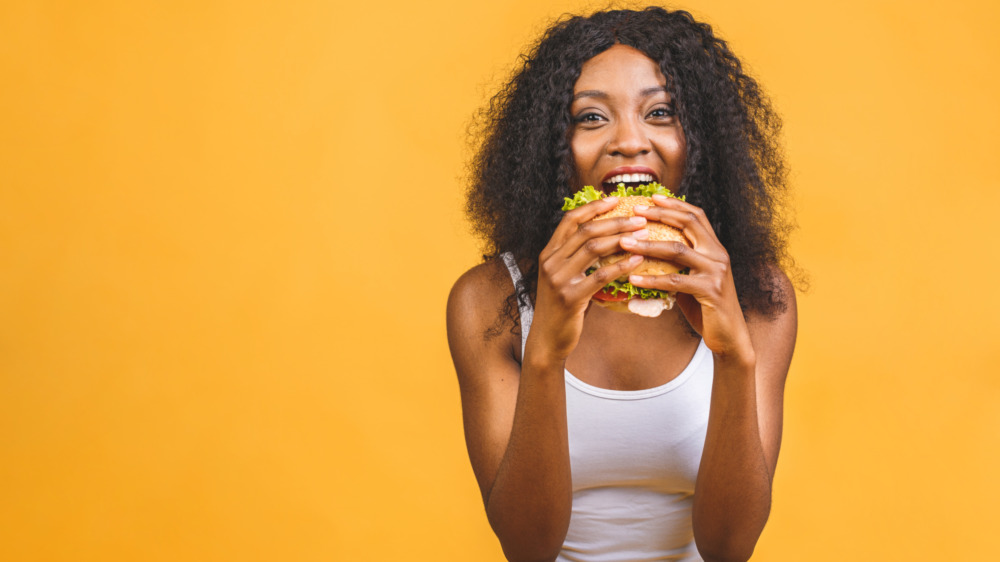The Real Reason You Need To Change The Way You Talk About Food
We've all heard of "body shaming" or "fat shaming" (although "thin shaming" is a thing, too), which is what happens when people are openly critical of other peoples' – or, at times, even their own – shape and size. Yes, it's a bad thing, but the issue is a bit more complex than just "haters gonna hate." Many critics of the body positivity movement argue that it sets a dangerous precedent in promoting complacency about the correlation between diet and health.
Those who feel as if it's their mission to comment on the health issues of others, without any real knowledge, are perpetrators of what Registered Dietitian Sue Heikkinen would call "food shaming." Heikkinen, the resident expert and dietitian for the nutrition app MyNetDiary, explains that food-shaming occurs when a person comments "about one's food choices, or the amount of food they are eating." Examples include, "Are you really going to eat that?," or even jokingly stating, "How could you still be hungry?"
While these instances may not be said with ill-intent, Heikkinen explains that offering unsolicited advice, even in jest, does far more harm than good.
Why we food shame
Why would one person feel compelled to make another person feel bad about what they're eating? Or, if we're self-food shaming, why would we be embarrassed by certain tastes and preferences, whether or not we give in to them? The way Sue Heikkinen explains it, "Traditional dieting mentality makes certain foods off-limits, causing people to think of food as either 'good' or 'bad.'" Admit it, these are words we've all used from time to time, saying such things as "I was good today, I only had a salad" or "I'm going to be really naughty and have a chocolate shake instead of a kale smoothie." Heikkinen points out that we also use negative terminology like "cheating" on our diet, as if it were a spouse and a Hershey bar our far more alluring mistress.
"The truth is," says Heikkinen, "that our food choice is not a reflection of our moral character." Although she is a health professional, she advocates for a healthy lifestyle based on an overall "pattern of choices" rather than a strict, unbreakable regimen, and tells us that "a single ice cream cone or cheeseburger does not equal an unhealthy diet."
The harm done by food shaming
But why is food shaming such a bad thing, if we're only trying to express our concern about someone's health? "Shaming" of any sort is never a positive message, since it implies trying to make somebody feel as if they're in the wrong. Among the "negative effects" Heikkinen sees as arising from food shaming are "guilt and an unhealthy relationship with food,", something she warns "can actually fuel more eating or eating disorders."
Another downside of the unhelpful rhetoric is the potential breakdown of close relationships. While Heikkinen says that food shamers may feel as if they are being helpful, their comments, in fact, "can wind up creating a strained relationship." Instead of cutting these well-intended but uninformed individuals out of your life, Sue Heikkinen reccomends, "If the food shamer is a well-intentioned family member or loved one, you may offer ways they can actually support you, such as going for a walk together or trying a new healthy recipe."
If you feel like you are being singled out or embarrassed when you eat, Sue Heikkinen insists, "Don't internalize negative messages from food shamers." She explains, "Food shamers often have their own conflicted relationship with food. They may be jealous when they see you eating food they have deemed off-limits." Adding, "You don't have to engage with food shamers. They don't know how a certain food selection fits into your overall goals, nor is it their business." She suggests changing the subject or perhaps using a polite brush-off like "It sure is delicious, and it fits in my plan."
How to handle your own food shaming thoughts
But what can you do if you find yourself on the receiving end of your own food shaming? As Heikkinen wisely notes, "Unfortunately, we are often harder on ourselves than we are on others." And truer words were never spoken. In that case, Heikkinen says you need to "become aware of the thoughts that pop into your head when you eat certain foods," and then immediately "reframe these negative thoughts to put yourself back in charge." As an example, she says, instead of telling yourself "I blew it," you can simply say "I choose to enjoy this, and I know it can fit into my plan."
Better yet, Heikkinen advises, "Tracking with an app like MyNetDiary allows you to gain a non-judgmental overview of your food choices and how treats can actually fit into your plan. Instead of feeling guilty about a treat, you will learn to make intentional, mindful food choices and permit yourself to enjoy them with no shaming. Also, App features like seeing the Calorie Burn Time of foods empowers users to make informed decisions about their food choices."
If you are struggling with an eating disorder, or know someone who is, help is available. Visit the National Eating Disorders Association (NEDA) website or contact NEDA's Live Helpline at 1-800-931-2237. You can also receive 24/7 Crisis Support via text (send NEDA to 741-741).



